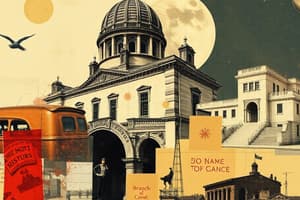Podcast
Questions and Answers
What does political history primarily focus on?
What does political history primarily focus on?
- Cultural expressions of societies
- Patterns of production and trade
- Social structures and daily life
- Leadership, institutions, and power dynamics (correct)
Which type of source provides firsthand accounts of historical events?
Which type of source provides firsthand accounts of historical events?
- Primary sources (correct)
- Critical analysis articles
- Historiographical reviews
- Secondary sources
What is a crucial aspect historians must consider when interpreting historical sources?
What is a crucial aspect historians must consider when interpreting historical sources?
- Only the most recent interpretations available
- The popularity of the sources among the public
- The biases and limitations of the historian's perspective (correct)
- The geographical location of the sources
Which branch of history involves the study of ideas and thought systems?
Which branch of history involves the study of ideas and thought systems?
What characterizes the nature of historical interpretation?
What characterizes the nature of historical interpretation?
Flashcards
History definition
History definition
The study of past events, people, and societies.
Primary sources
Primary sources
Direct evidence from the past (e.g., letters, diaries)
Historical Bias
Historical Bias
Historians' own opinions or perspectives that might influence how they write about the past.
Historical methods
Historical methods
Signup and view all the flashcards
Historical interpretation
Historical interpretation
Signup and view all the flashcards
Study Notes
Historical Periods and Concepts
- History encompasses the study of past events, people, and societies, encompassing a vast spectrum of time and cultures.
- It is a field that seeks to understand how and why things happened in the past by examining various sources of evidence.
Branches of History
- Various branches exist, each specializing in different aspects of the past.
- Political history focuses on the leadership, institutions, and power dynamics of societies.
- Social history investigates social structures, beliefs, and daily life.
- Economic history explores patterns of production, trade, and consumption in societies.
- Cultural history examines the arts, ideas, and expressions of different cultures.
- Military history studies warfare, strategy, and the impact of armed conflict.
- Intellectual history focuses on the development of ideas and thought systems in different historical periods.
Historical Methods
- Historians employ specific methodologies to investigate the past.
- Primary sources, like letters and diaries, provide direct insights into the past.
- Secondary sources, including academic articles and books, analyze and interpret primary sources for a deeper understanding.
- Critical evaluation and interpretation are crucial for interpreting sources accurately, acknowledging biases and limitations.
- Historical context of events is vital for interpreting the past.
Historical Interpretation and Bias
- Historical interpretation is complex and multifaceted.
- Historical narratives are shaped by the perspective and biases of historians, who might unconsciously filter events.
- Multiple perspectives exist and should be considered when examining the past.
- The selection of specific events emphasized in historical accounts influences the interpretation of the past.
- Varying factors and contemporary issues often influence the interpretation of history, leading to diverse perspectives and conclusions.
Historical Sources
- Historical sources are crucial for understanding the past.
- Archives, museums, and libraries house primary sources, including documents, artifacts, and oral accounts.
- Access and handling of these sources requires careful methods to preserve their integrity.
- The authenticity and reliability of sources should be rigorously assessed.
Historical Continuity and Change
- History involves understanding continuity and change over time.
- Societal structures, beliefs, and practices often endure throughout time, while also undergoing significant transformations.
- Identifying the factors driving these changes is an important task in historical scholarship.
- Studying change and continuity reveals patterns and insights about the human experience.
Historical Context
- Understanding the context is essential for understanding the past.
- Geographic and environmental factors, demographic shifts, political and economic systems, and cultural influences contribute to historical events and their interpretation.
- Evaluating these considerations enriches the understanding of historical phenomena.
Historical Figures
- Key figures are fundamental to understanding historical events and turning points.
- Studying their lives, actions, and influence provides valuable insights into the past.
- Examining historical figures through multifaceted lenses helps gain a nuanced perspective.
The Role of History
- The study of history is significant for various reasons.
- Studying the past provides insights into the present and offers lessons for the future.
- It informs current challenges and guides future decisions by examining similar past events.
- It fosters critical thinking, promoting an understanding of multiple viewpoints and perspectives.
Historical Significance
- Significance of historical events is often debated considering how societies respond to events.
- Evaluating how people reacted to events can provide insights into societal values and shifts.
- The lasting impacts of events provide a multifaceted historical significance.
- Significance changes over time with evolving perspectives and societal values.
Studying That Suits You
Use AI to generate personalized quizzes and flashcards to suit your learning preferences.



